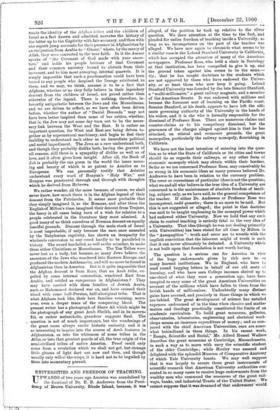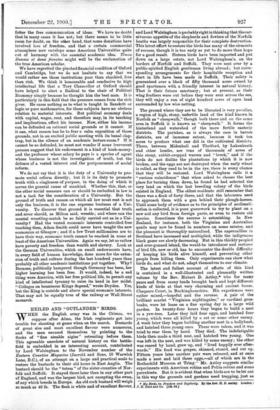UNIVERSLUES AND FREEDOM OF TEACHING.
UPWARDS of two years ago America was scandalised by the dismissal of Dr. E. B. Andrewes from the Presi- dency of Brown University, Rhode Island, because,, it Was
alleged, of the position he took up relative to the silver question. We drew attention at the time to the fact, and pleaded for entire freedoni of teaching inside a University, so long as no incompetence on the part of the teacher was alleged. We have now again to chronicle what seems to be a similar case in the Leland Stanford University in California, which has occupied the attention of many of the American newspapers. Professor Ross, who held a chair in Sociology at that institution, has been compelled to give it up, and the ground taken against him seems to be the same,— viz., that he has taught doctrines to the students which are not approved by those who have endowed the Univer- sity, or at least those who now keep it going. Leland Stanford University was founded by the late Senator Stanford, a "multi-millionaire," a great railway magnate, and a member of the American Senate. It was endowed with millions and became the foremost seat of learning on the Pacific coast. Senator Stanford, at his death, appears to have left the ulti- mate governing authority of the University in the hands of his widow, and it is she who is formally responsible for the dismissal of Professor Ross. There are numerous claims and counter-claims as to his compulsory dismissal, but the gravamen of the charges alleged against him is that he has attacked, on ethical and economic grounds, the great monopolies, particularly the railway monopoly, flourishing in California.
We have not the least intention of entering into the ques- tion as to what the State of California or its cities and towns should do as regards their railways, or any other form of economic monopoly which may obtain within their borders. So far as we are concerned Professor Ross, may conceivably be as wrong in his economic ideas as many persons believed Dr. Andrewes to have been in relation to the currency problem. The error or correctness of particular ideas is not the question; what we and all who believe in the true idea of a University are concerned in is the maintenance of absolute freedom of teach- ing, subject only, as we have said, to the general competence of the teacher. If either Dr. Andrewes or Professor Ross was incompetent, cadil quaestio; there is no more to be said. But this is not suggested or alleged; the point is that doctrine was said to be taught unpleasing to the moneyed power which had endowed either University. Now we hold that any such claim to control teaching is entirely fatal to the very idea of a University. That idea (though he was not dealing primarily with Universities) has been stated for all time by Milton in the " Areopagitica " : truth and error are to wrestle with the implicit conviction that the inherent might of truth is such that it can never ultimately be defeated. A University which is not built upon that foundation is not worth having.
The question is a serious one for America in view of the huge endowments given by rich men to so many learned institutions. We in England, who have to send round begging letters in behalf of our old seats of learning, and who have seen College incomes shrivel up to one-third of what they were a generation ago, have been tempted to envy some of the great American Universities on account of the millions which have fallen to them from the lavish hands of millionaires. Undoubtedly many distinct gains have accrued, and precisely in those things in which we are behind. The great development of science has entailed expenses undreamed of in the time when classics and mathe- matics and theology practically constituted the limits of an academic curriculum. To build great museums, galleries, observatories, laboratories, engineering and electrical work- shops means an immense expenditure of money; and as com- pared with the chief American Universities, ours are some- what behindband in these things. In his recent work, " Essays, Scientific and Social," Mr. Alfred Russel Wallace describes the great museums at Cambridge, Massachusetts, in such a way as to move with envy the scientific student of the older Cambridge ; while Huxley was amazed and delighted with the splendid Museum of Comparative Anatomy of which Yale University boasts. We may well suppose that it was largely to secure these great instruments of scientific research that American University authorities con- sented in so many cases to receive huge endowments from the wealthy men who command the resources of the great rail- ways, banks, and industrial Trusts of the United States. We cannot suppose that it was dreamed of that endowment would fetter the free communication of ideas. We have no doubt that in many cases it has not; but there seems to be little room for doubt, on the other hand, that some donations have involved loss of freedom, and that a certain commercial atmosphere now envelops some American Universities quite out of harmony with the essential academic idea. Timeo Danaos et dona ferentes might well be the exclamation of the true American scholar.
We have regretted the pinched financial condition of Oxford and Cambridge, but we do not hesitate to say that we would rather see those institutions poor than shackled, free than rich. We think it honourable and conducive to high intellectual life that a Tory Chancellor at Oxford should have helped to elect a Radical to the chair of Political Economy simply because he thought him the best man. It is particularly in this field that the pressure comes from the rich giver. He cares nothing as to what is taught in Sanskrit or logic or pure mathematics, for these subjects have no obvious relation to material interests. But political economy deals with capital, wages, rent, and therefore may, in its teaching and implications, affect his income. Now, either his income can be defended on rational social grounds or it cannot. If it can, what reason has he to fear a calm exposition of those grounds, not in an excited public meeting with its banal clap- trap, but in the silence of an academic lecture-room P If it cannot be so defended, he must not wonder if some irreverent persons suggest that his endowment is a kind of hush-money, and the professor whose salary lie pays is a species of agent whose business is not the investigation of truth, but the defence of a vested interest and the postponement of social reform.
We do not say that it is the duty of a University to pro- mote social reform directly ; but it is its duty to promote truth with a singleness of purpose, in the doing of which it serves the general cause of mankind. Whether this, that, or the other tocial measure can or should be embodied in law is not a task for the consideration of a University. But the ground of truth and reason on which all law must rest is not only the business, it is the one supreme business of a Uni- versity. To discover that ground it is essential that truth and error should, as Milton said, wrestle; and where can the mental wrestling-match be so fairly carried out as in a Uni- versity ? Had the vested economic interests controlled free teaching then, Adam Smith could never have taught the new economics at Glasgow ; and if a few Trust millionaires are to have their way, economic truth cannot be reached in some at least of the American Universities. Again we say, let us rather have poverty and freedom than wealth and slavery. Look at the German Universities, which on small endowments have, in every field of human knowledge, done more for the exten- sion of truth and culture during the last hundred years than probably all other academic institutions put together. Why P Because, politically hampered though Germany has been, her higher learning has been free. It would, indeed, be a sad thing were America, with her free political life, to permit any kind of intellectual tyranny to raise its head in her midst. " Colleges on bounteous Kings depend," wrote Dryden. Yes, but the King is outside and above special economic interests. That may not be equally true of the railway or Wall Street monarch.







































 Previous page
Previous page